Surprise to no one, the Pacific Northwest was vigorously logged in the 1800′s and 1900′s. My dad worked in a logging camp as a young man in the upper peninsula of Michigan. And, on his own Forty, years later, he logged and peeled pulp trees for the paper mills in the 1940′s. He selectively logged those few bigger oaks, pines, cherry and fir that remained to grow to harvestable size after the big companies had already raped the virgin forests.
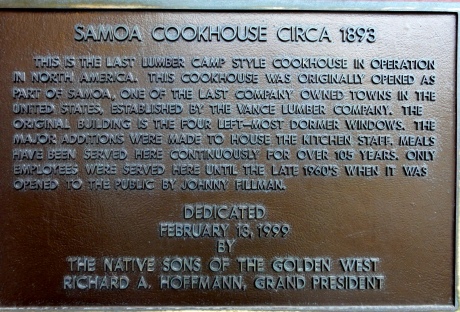
Jim thought I’d like to celebrate my birthday at the only remaining Lumber Camp Cookhouse still operating in North America, the Samoa Cookhouse near Humboldt Bay.
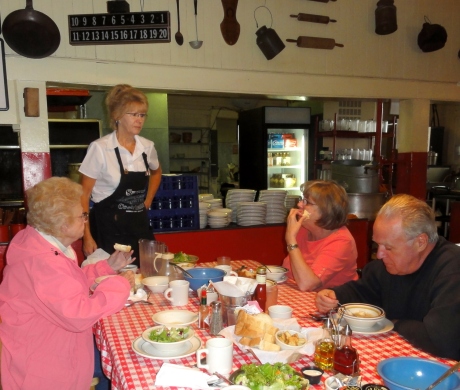
Open seven days a week, serving breakfast, lunch and dinner, the meals are served family style with soup, bread, salad, vegetables, an entrée. All you can eat. Then followed with desert. It is the type of food the loggers ate, simple but hearty meals for hard-working men.
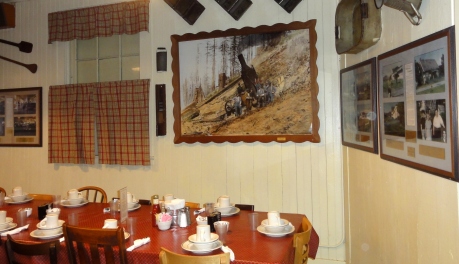
The old original dining room has been expanded. It now includes a logging museum and gift shop. This famous cookhouse has been continuously serving meals for over 100 years. Quite a feat. Busloads of people from all over stop on their way through Humboldt County.
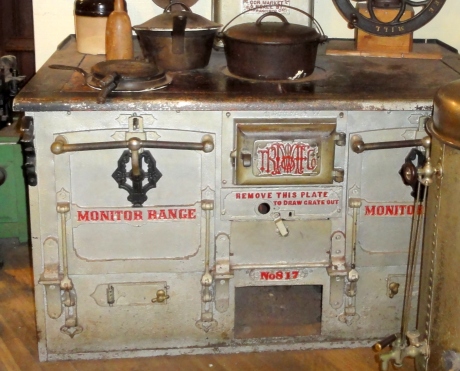
The old Monitor wood burning range, originally used in the cookhouse, is in the museum.
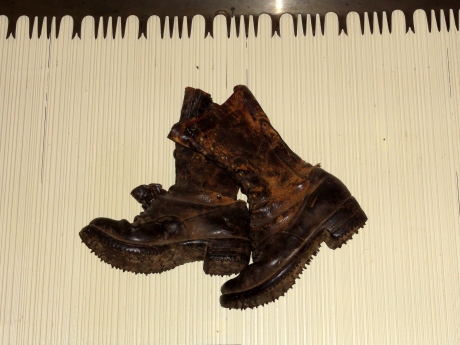
If these old hobnail boots could speak they would have some interesting stories to tell. The museum floor has spike marks in the floor boards from the booted “jacks” that tromped through the old place.
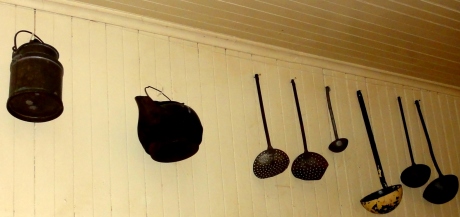
The walls have pictures and artifacts everywhere, in the restaurant, hallways, and the museum.

I own my dad’s saw of this type, shorter, to be sure. In the Pacific they lumbered redwood trees. In one wall photo is displayed several men holding up a 28 ft. long saw that was used to cut through a 21 foot in diameter redwood giant. These giants are Sequoia sempervirons, the tallest trees in the world. In Calaveras County where I live we have Calaveras Big Trees State Park where grow the Sequoia gigantea, the biggest trees in the world, heavier and squatter than their cousins.
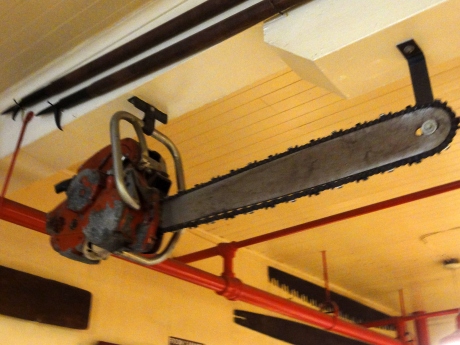
All tools here are oversized.
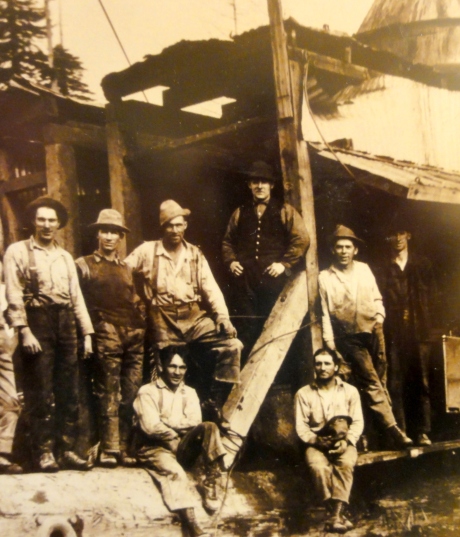
And jacks were notoriously big and burly to handle the job.
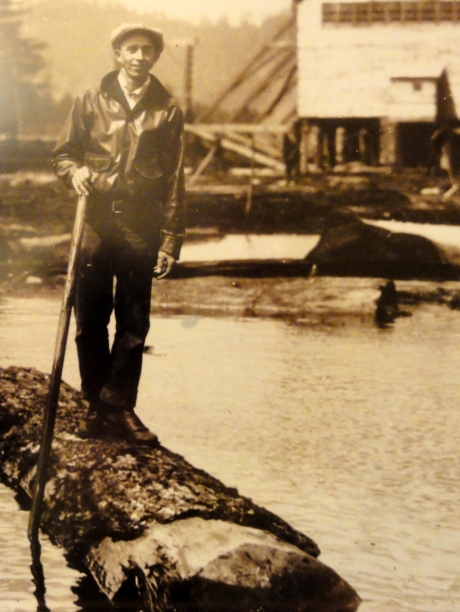
Or strong and nimble as this fellow, dancing the logs. They were floated down the Mad River into Humboldt Bay during one logging companies control of the mill and town.
Samoa has a great logging history and many interesting photos on the walls. Many are available for purchase.
Because of the storm, (hail expected with heavy rain) we will hold up a second day in Eureka and head for the Trail of the Redwoods tomorrow.

Jim thought I’d like to celebrate my birthday at the only remaining Lumber Camp Cookhouse still operating in North America, the Samoa Cookhouse near Humboldt Bay.

Open seven days a week, serving breakfast, lunch and dinner, the meals are served family style with soup, bread, salad, vegetables, an entrée. All you can eat. Then followed with desert. It is the type of food the loggers ate, simple but hearty meals for hard-working men.

The old original dining room has been expanded. It now includes a logging museum and gift shop. This famous cookhouse has been continuously serving meals for over 100 years. Quite a feat. Busloads of people from all over stop on their way through Humboldt County.

The old Monitor wood burning range, originally used in the cookhouse, is in the museum.

If these old hobnail boots could speak they would have some interesting stories to tell. The museum floor has spike marks in the floor boards from the booted “jacks” that tromped through the old place.

The walls have pictures and artifacts everywhere, in the restaurant, hallways, and the museum.

I own my dad’s saw of this type, shorter, to be sure. In the Pacific they lumbered redwood trees. In one wall photo is displayed several men holding up a 28 ft. long saw that was used to cut through a 21 foot in diameter redwood giant. These giants are Sequoia sempervirons, the tallest trees in the world. In Calaveras County where I live we have Calaveras Big Trees State Park where grow the Sequoia gigantea, the biggest trees in the world, heavier and squatter than their cousins.

All tools here are oversized.

And jacks were notoriously big and burly to handle the job.

Or strong and nimble as this fellow, dancing the logs. They were floated down the Mad River into Humboldt Bay during one logging companies control of the mill and town.
Samoa has a great logging history and many interesting photos on the walls. Many are available for purchase.
Because of the storm, (hail expected with heavy rain) we will hold up a second day in Eureka and head for the Trail of the Redwoods tomorrow.
2 comments:
balenciaga sneakers
hermes belt
moncler coat
nfl jerseys wholesale
yeezys
moncler
coach outlet stores
hermes belts
yeezy 500
balenciaga sneakers
replica bags koh samui replica bags replica bags blog
Post a Comment